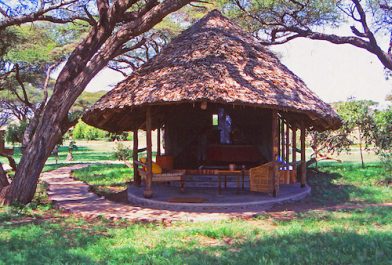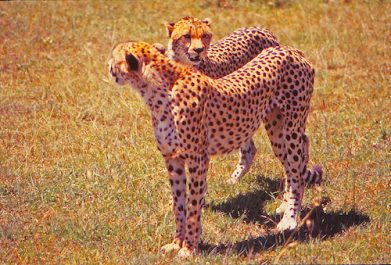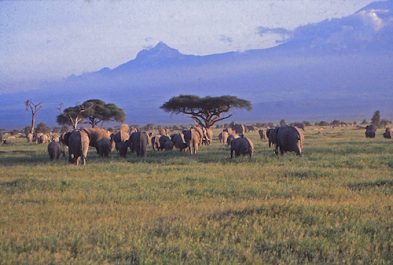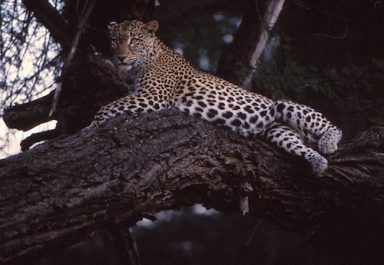My Trip To Kenya, By Gloria Willis
 The sound of a zipper opening my tent pulls me from a deep sleep. It’s still a half hour before sunrise. I open my eyes to see a huge smile and a piping hot pot of tea being handed to me.
The sound of a zipper opening my tent pulls me from a deep sleep. It’s still a half hour before sunrise. I open my eyes to see a huge smile and a piping hot pot of tea being handed to me.
“Jambo” he says. ”Jambo,” I reply in my very best Swahili. “Here’s some tea and biscuits to get you started. It’s going to be a beautiful morning.”
Still groggy, I plant my feet on the wooden floor and get ready for the day. The hot water bottle I placed at the foot of my cot last night is now as cold as the morning air.
The tent stands on a semi-permanent wood platform and has a small bathroom attached to the back. Looking through the small mesh window I can vaguely make out the shapes of screaming baboons as they run back and forth past the camp.
After scrubbing myself with insect repellent I grab my hat, camera, and lenses and throw them in my vest. I leave my tent but not before I remember to re-zip it and tie the zipper ends together.
Baboons know how to unzip tents, and if you don’t tie the ends together they will let themselves in and wreak havoc on the place.
After loading up into the Land Rover it’s time to head out into the brush. The sun is just beginning to peep over the horizon, making this the prime time for when the animals are most active.
We haven’t gone far before we come across a small pride of lions polishing off the remains of last night’s zebra for dinner. The males have already gotten their fill and now the lionesses and cubs are eating, although three of the cubs are more interested in playing tug-of-war with an almost barren leg bone instead of finishing their dinner.
They pay no attention to us, giving us the opportunity to get plenty of up close and personal photos.
The next stop is the Mara Plains. Filled with lush, thigh-high grass and acacia trees, it’s located on the northern border of the Maasai Mara.
Ronnie, our guide, points out something moving in the distance on top of a tall termite mound. It’s a cheetah and her sister at the base of the mound carefully watching a small, lone Thomson’s gazelle.
Their movements are fluid and quiet. They have a method to their hunting. The first cheetah waits patiently as the unwitting gazelle grazes, unknowingly moving closer.
In the blink of an eye, she leaps from the mound and totally surprises the young Tommy. The chase lasts less than a minute as the cheetah effortlessly maneuvers her prey onto the path of her crouching sister. That was an easy breakfast.
Then, we spot slight movement in the grass at the edge of a thicket so we kill the engine. Within a few minutes two small lion cubs poke their curious heads through the underbrush and quickly pull them back. Their mother is telling them to keep hidden while she hunts for their breakfast.
Ronnie looks at his watch and decides it’s time to head back to camp for breakfast. It’s hard to believe, but we’ve already been out for nearly two hours.
The sun begins to warm up the morning as we enjoy breakfast back at camp. Without warning a large bull elephant wanders within 50 or 60 yards of our camp. One by one we quietly pick up our plates and head inside a tent surrounded by a barricade of horizontal telephone poles.
The elephant gets a whiff of breakfast and decides it’s to his liking. He heads directly for Ronnie who is now sitting alone at the table we just left. When he’s almost within reach, Ronnie decides to leave his plate and head for the secured tent.
The elephant stops at the table and within minutes devours Ronnie’s eggs, bacon, biscuits and marmalade. Then, just as casually as he came, he wanders back off into a dense thicket.
That sums up life out here. Survival of the biggest.
Like yesterday when we were heading back to camp near sunset and saw a large cloud of dust in the same direction as Mt. Kilimanjaro. Out of curiosity we decided to see what was going on when we came across a herd of 274 elephants.
It was an incredible moment that delivered amazing photos for the other photographers and myself. It was one of those times when you throw caution to the wind and go for it, seizing every opportunity to capture incredible, once-in-a-lifetime photos.
Just as there are a ton of incredible moments to capture, there is also down time. During the day between game-watching runs you might find time to take a nap, organize your images, write in your journal, play cards or just read.
After a week or so in the bush you’ll be ready for some civilization. It’s hard to beat the Mt. Kenya Safari Club near Nanyuki.
Once owned by William Holden, who reportedly won it in a card game, Nanyuki rests right on the equator. When playing tennis, you’ll serve from one hemisphere while you opponent waits in the other hemisphere. In the swimming pool can swim from below the equator, to the northern hemisphere, and back. I once stood with a leg on each side, north and south.
The tented camps in Kenya and East Africa are well equipped and comfortable. Semi-permanent tents rest on wooden platforms and usually have a small front patio with chairs.
The tents are zippered, secure, and lighted with propane lanterns. Small rustic dressers, a small bed or cot, a writing desk and bathroom with a shower are also in each tent. You’re always within a short walking distance of the dining tent and an area where a campfire is held at night.
Some camps are situated near watering holes and are lighted at night for game watching. In a few cases, the camps are situated with tents further apart and you may need an armed guard to escort you back to your tent.
You’ll undoubtedly spend a night or two in Nairobi. There are at least three sites worth visiting. The first is the National Museum that houses many of the prehistoric treasures discovered by Louis Leakey and his son, Richard Leakey.
When I was last there the museum housed the skull of Lucy, the most famous hominid fossil and once described as the oldest human-like being ever found.
Betty Bruce Melville and her husband, Jacques, founded Giraffe Manor, a lovely English countryside manor house where Betty established a safe haven for the endangered Rothschild’s giraffe.
The most famous, Daisy, was the subject of several National Geographic stories and films. Today, you can visit the estate, feed the free-roaming giraffes, and even spend a few days in the luxurious manor house.
Jacques’ family was well acquainted with Danish author Baroness Karen Blixen, and when she returned to Scandinavia she left a few mementos with his family including the mantle clock and wind-up phonograph that were loaned to Sydney Pollack when he filmed the movie, Out Of Africa.
Mombasa is nearby on the coast of the Indian Ocean and has been in existence for more than ten centuries. The town is filled with street merchants, traders and pickpockets. It’s an incredible way to round out your excursion before heading home.
In the ancient harbor you can watch the dhows being loaded and unloaded using nothing but human power as they bring in spices and take cargo to nearby Zanzibar.
You’ll definitely want to relax on the hotel beaches before heading home. Believe me, you’ll need some time to recuperate before for your long trip home.
With its beautiful safaris, incredible wildlife, and scene-stealing landscape, Kenya makes for a trip of a lifetime that you’ll never forget.
For the best in worldwide destinations go to www.abercrombiekent.com
















